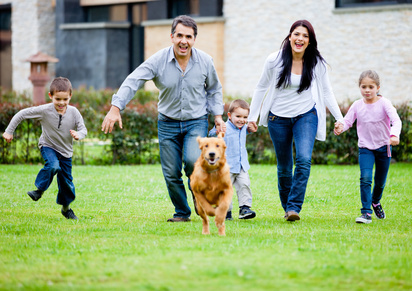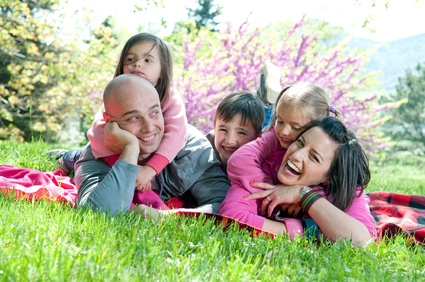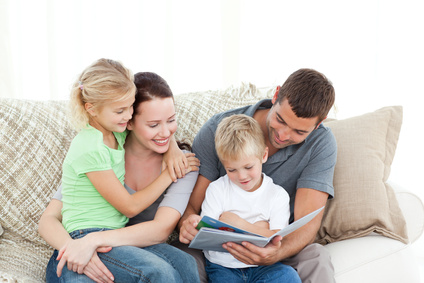The first and most important ingredient in your school readiness recipe, is to support your child to develop a healthy and good self-concept. Without it he will never be able to be a happy, well balanced child who will love himself.
What does self-concept imply?
It is the child's mental picture of his abilities and traits.
Practical ways of developing a positive self-concept:
- Practice what you preach. Be a good role model for your child.
- Enjoy life. Smile and laugh a lot. If you experience every day life as one big obstacle, don't expect that your child to experience life differently.
- Have fun together as a family. We don't have any opportunity to do a rehearsal in life, this is the life we are in and we are busy living it. Teach your child to live life to the fullest in spite of obstacles and teach him that there will always be some or other challenge in life - so therefore rather have a broken halleluja than no halleluja at all.
- As family you should at least have one meal a day together. It should preferably be a meal where you have time and not a meal during the rushing hours of the morning when everybody has to get ready for work and school. Listen to your child. Ask him about his day: What was exciting and/challenging and how did he handle it. Don't critisize your child for all the wrong things he did, but focus on the positive aspects that he did well. Ask him whether he will handle such a situation differently in future and let him share it with you.
- Talk about light hearted things as well, for example what you, as family, are planning to do together the weekend, the news of the day, new movies and outside activities that you want to do together.
- Praise your child when he did something right and when he did his best, in spite of the mistakes he made.
- Support your child to express himself. It is important to help him to identify his emotions and feelings.
- As parents your child should know that you are experiencing different feelings and emotions as well and that it is FINE to have emotions and feelings.
- Tell your child when you, for example had a bad day, and that you feel down, but also tell him what you are going to do to solve the problem (maybe it will just be to go for a quick walk with your family after dinner, or to play your favourite happy song and let the other family members also play theirs). By doing this you will learn more about one another and you will share a lot of practical life skills of dealing with stress, anger and happiness and joy!
- Plan activities in such a way that your child will be able to experience success.
- Criticism should always be positive and encouraging.
- Allow your child to do things in his own way and to take responsibility for his choices. This will be the only way that he will learn out of his mistakes. Then you will have the opportunity to encourage him for trying something and to teach him the important life skill that "Success is not final, failure is not fatal. It is the courage to continue that counts" (Winston Churchill).
- Give your child at least three compliments a day by focusing on things and characteristics about him that's unique and special.
- Communicate unconditional acceptance and love to your child through your words, but also with your gestures and body language.
- Encourage your child to express his ideas that differ from yours.
- Create opportunities for your child where he can express himself creatively, for example to choose a theme for his birthday party, to have the choice of a family activity (preferably outside the house and not in front of the tv or computer).
ACTIVITIES TO DO TOGETHER AS A FAMILY (You should pick at least three a week)
NOTE THEY are GREEN!! Because they don't involve passively sitting and not communicating with one another.
- Go for a walk
- Cycling
- Reading (take turns to read; little ones who can't read yet, pick a story and tell it)
- Listen to your favourite happy song
- Have a picnic
- Lay on the grass and look at the stars/shapes of the clouds
- Dance (while "following" the leader - take turns to be the leader)
- Take funny photo's together
- Sit together at the fire site and talk/tell stories
- Play card games/board games
- Prepare food together (divide the tasks)
CHALLENGE: Practice your creativity as a family and try to add six more similar activities to the GREEN list!
Look out for next week's talk on how to further support your child, through play, to get ready for school.
Resources: (De Witt & Booysen 1994; Gordon & Browne 2004; Papalia, Olds & Feldman 2004)
What does self-concept imply?
It is the child's mental picture of his abilities and traits.
Practical ways of developing a positive self-concept:
- Practice what you preach. Be a good role model for your child.
- Enjoy life. Smile and laugh a lot. If you experience every day life as one big obstacle, don't expect that your child to experience life differently.
- Have fun together as a family. We don't have any opportunity to do a rehearsal in life, this is the life we are in and we are busy living it. Teach your child to live life to the fullest in spite of obstacles and teach him that there will always be some or other challenge in life - so therefore rather have a broken halleluja than no halleluja at all.
- As family you should at least have one meal a day together. It should preferably be a meal where you have time and not a meal during the rushing hours of the morning when everybody has to get ready for work and school. Listen to your child. Ask him about his day: What was exciting and/challenging and how did he handle it. Don't critisize your child for all the wrong things he did, but focus on the positive aspects that he did well. Ask him whether he will handle such a situation differently in future and let him share it with you.
- Talk about light hearted things as well, for example what you, as family, are planning to do together the weekend, the news of the day, new movies and outside activities that you want to do together.
- Praise your child when he did something right and when he did his best, in spite of the mistakes he made.
- Support your child to express himself. It is important to help him to identify his emotions and feelings.
- As parents your child should know that you are experiencing different feelings and emotions as well and that it is FINE to have emotions and feelings.
- Tell your child when you, for example had a bad day, and that you feel down, but also tell him what you are going to do to solve the problem (maybe it will just be to go for a quick walk with your family after dinner, or to play your favourite happy song and let the other family members also play theirs). By doing this you will learn more about one another and you will share a lot of practical life skills of dealing with stress, anger and happiness and joy!
- Plan activities in such a way that your child will be able to experience success.
- Criticism should always be positive and encouraging.
- Allow your child to do things in his own way and to take responsibility for his choices. This will be the only way that he will learn out of his mistakes. Then you will have the opportunity to encourage him for trying something and to teach him the important life skill that "Success is not final, failure is not fatal. It is the courage to continue that counts" (Winston Churchill).
- Give your child at least three compliments a day by focusing on things and characteristics about him that's unique and special.
- Communicate unconditional acceptance and love to your child through your words, but also with your gestures and body language.
- Encourage your child to express his ideas that differ from yours.
- Create opportunities for your child where he can express himself creatively, for example to choose a theme for his birthday party, to have the choice of a family activity (preferably outside the house and not in front of the tv or computer).
ACTIVITIES TO DO TOGETHER AS A FAMILY (You should pick at least three a week)
NOTE THEY are GREEN!! Because they don't involve passively sitting and not communicating with one another.
- Go for a walk
- Cycling
- Reading (take turns to read; little ones who can't read yet, pick a story and tell it)
- Listen to your favourite happy song
- Have a picnic
- Lay on the grass and look at the stars/shapes of the clouds
- Dance (while "following" the leader - take turns to be the leader)
- Take funny photo's together
- Sit together at the fire site and talk/tell stories
- Play card games/board games
- Prepare food together (divide the tasks)
CHALLENGE: Practice your creativity as a family and try to add six more similar activities to the GREEN list!
Look out for next week's talk on how to further support your child, through play, to get ready for school.
Resources: (De Witt & Booysen 1994; Gordon & Browne 2004; Papalia, Olds & Feldman 2004)





 RSS Feed
RSS Feed
